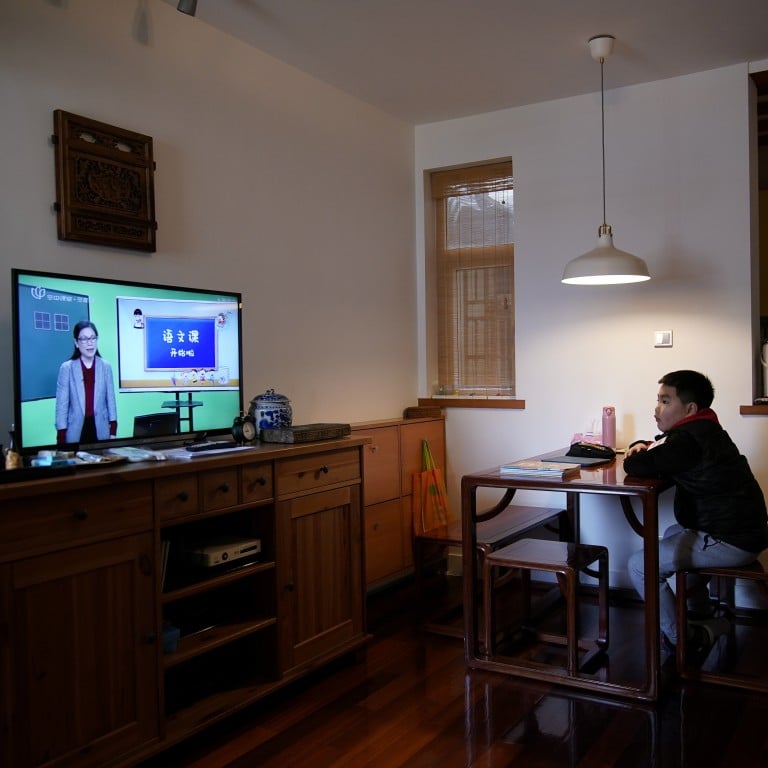
Online education sector could be among biggest beneficiaries of Covid-19, may be worth US$61 billion in China this year
- Tectonic shift in education, as online tutoring and education become more common, Hurun Report says as it releases list of sector billionaires
- Online education one of several thriving niche sectors in China: Mergermarket
Online education and educational technology companies could be among the biggest beneficiaries of the Covid-19 pandemic as schools across the world shut, forcing children to learn from home. In China, the sector was expected to grow 12.3 per cent to 435.8 billion yuan (US$61.5 billion) this year.
Hurun Report, which on Thursday released its first ever global list of billionaires who made their fortunes in the education business, said the education sector was going through a tectonic shift, as online tutoring and education became more common.
Rupert Hoogewerf, Hurun Report’s founder, said mainstream education institutes were being forced to offer online courses, and that valuations of traditional education institutions had recorded a severe drop, compared to the quick rise of education technology-focused companies.
In China, by one estimation, online education might actually be a lifeline for traditional institutions in these challenging times. “Amid the coronavirus impact, we would expect the China education sector to see the least impact compared to other sectors, as we see most students’ tuition [fees] are paid in advance and we are unlikely to see any refund, given that a majority of schools can still perform their teaching via online education,” said Jenny Tsai, senior equity analyst for financial services firm Morningstar. In fact, education stocks might even be good value for money right now. “We would suggest investors to look for re-entry points, as the sector pulls back due to the overall market index weakness caused by the coronavirus uncertainty or panic.”
Mergermarket identified online education as one of several thriving niche sectors in China, in a report released on Thursday, saying that 2020 was expected to be the “golden age” for China’s online education sector. The market was expected to grow 12.3 per cent to 435.8 billion yuan this year, according to iiMedia Research.
“The digitalisation of education is inevitable. The sudden epidemic accelerates the process by shifting all Chinese K12 users learning online,” said Amber Zhang, director at TH Capital, a Beijing-headquartered investment bank. She said that as schools remained closed for longer periods of time, students and teachers would grow accustomed to online learning.
Educational apps are now the second-fastest growing apps as measured by users, moving past lifestyle, social media and entertainment apps since early February, according to mobile data analytic platform Qimai.cn. Meanwhile, offline educational institutions were expected to suffer as online companies raise new rounds of investment.
Seven of the top 10 billionaires on the Hurun Report rich list were from China. They accounted for 12 positions out of the total 19 listed. The United States and the United Kingdom, despite having some of the world’s most prominent universities, had none.
“We recognise that for every one we have found, we have probably missed one if not more, so the total number of education billionaires ought probably be more than 40,” Hoogewerf said.
Topping the Hurun list were Lu Zhongfang and Li Yongxin, her son, the original investors and co-founders of Shenzhen-listed Offcn Education Technology, which focuses on education technology and training in mainland China, as well as test preparations for China’s civil service exams. Offcn shares have risen from 18.20 yuan at the beginning of this year to 23.23 yuan on Thursday. Their combined fortune was estimated at US$13 billion by Hurun, having tripled from this time last year.
Wang Zhendong, Offcn’s other founder, has a reported fortune of US$3.3 billion, and according to Forbes, holds 15.6 per cent of the company.
By sector, Hurun reported that vocational training was on top, followed by home tutoring, universities, language training and K12 schools.
Hong Kong-listed China East Education Holdings, which does vocational and online education in China, was highlighted by Morningstar as an undervalued stock to watch. “We expect China East Education’s five-year net profit CAGR to grow at 35.9 per cent,” the firm said in a research note published on March 1.
China East Education listed in Hong Kong in June last year, raising US$625 million and valuing the company at US$3.13 billion, according to Reuters. Its share price peaked at HK$17.34 on January 13, dropped to HK$12.36 on March 16, and has since climbed to HK$13.50.
Wu Wei and Xiao Guoqing, who founded China East Education, are listed by Hurun as having a net worth of US$1.2 billion each.
Hurun also listed Hong Kong-based billionaires Xie Ketao and Yu Guo with US$1 billion each. Xie and Yu co-founded Hong Kong-listed China Education Group Holdings, a holding company that focuses on providing tertiary education services.
The richest person on the list not from China was Switzerland’s Bertil Hult, who dropped out of college in 1965 to start a language training company, according to Forbes. The 79-year old is reportedly dyslexic. He is worth US$4 billion, according to Hurun.

